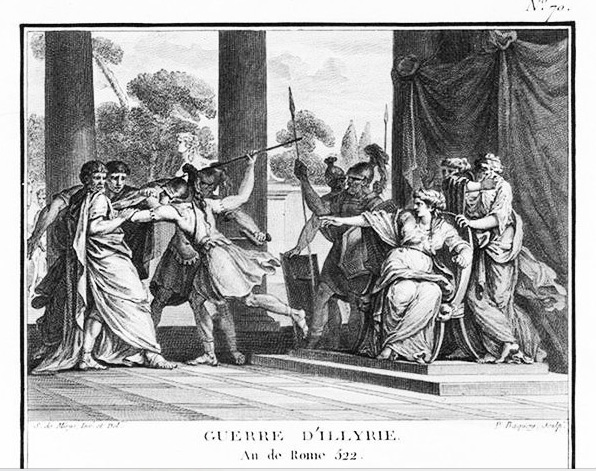First Illyrian War (229-228 BC)

The Illyrian Wars were a set of wars fought in the period 229–168 BC between the Roman Republic and the Ardiaei kingdom. In the First Illyrian War, which lasted from 229 BC to 228 BC, Rome's concern was that the trade across the Adriatic Sea increased after the First Punic War at a time when Ardiaei power increased under queen Teuta. Attacks on trading vessels of Rome's Italic allies by Illyrian pirates and the death of a Roman envoy named Coruncanius on Teuta's orders, prompted the Roman The Roman Republic was a form of government of Rome and the era of the classical Roman civilization when it was run through public representation of the Roman people. Beginning with the overthrow of the Roman Kingdom (traditionally dated to 509 BC) and ending in 27 BC with the establishment of the Roman Empire, Rome's control rapidly expanded during this period - from the city's immediate surroundings to hegemony over the entire Mediterranean world. senate to dispatch a Roman army under the command of the consuls Lucius Postumius Albinus and Gnaeus Fulvius Centumalus. Rome expelled Illyrian garrisons from a number of Greek cities including Epidamnus, Apollonia, Corcyra, Pharos and established a protectorate over these Greek towns. The Romans also set up Demetrius of Pharos as a power in Illyria to counterbalance the power of Teuta.
The Roman Republic was a form of government of Rome and the era of the classical Roman civilization when it was run through public representation of the Roman people. Beginning with the overthrow of the Roman Kingdom (traditionally dated to 509 BC) and ending in 27 BC with the establishment of the Roman Empire, Rome's control rapidly expanded during this period - from the city's immediate surroundings to hegemony over the entire Mediterranean world. senate to dispatch a Roman army under the command of the consuls Lucius Postumius Albinus and Gnaeus Fulvius Centumalus. Rome expelled Illyrian garrisons from a number of Greek cities including Epidamnus, Apollonia, Corcyra, Pharos and established a protectorate over these Greek towns. The Romans also set up Demetrius of Pharos as a power in Illyria to counterbalance the power of Teuta.

Queen Teuta of the Ardieai orders the Roman ambassadors to be killed

Queen Teuta of the Ardieai orders the Roman ambassadors to be killed
( Click image to enlarge)
Origins of the Conflict
Even before the war with Carthage (264-241 BC), the Romans had been aware of the danger to the Adriatic coast of Italy from seaborne attack. In 246 BC, a colony of Roman citizens was settled at Brundisium to keep a watch on the Ionian gulf. During their occupation of Phoenice, a number of Illyrian ships had engaged in privateering against Italian merchants. So many were robbed, murdered or captured that the Roman Senate, after ignoring earlier complaints, realized that something had to be done. Polybius (2.8) furnishes a suspiciously vivid account of a Roman embassy to Teuta, a version of events that was intended to justify the Roman invasion of Illyria. It was led by the brothers L. and Gn. Coruncanius. On arrival, they found Teuta celebrating the end of a rebellion in Illyria and engaged in laying siege to the Greek island of Issa, 'the last town which held out'. When the ambassadors complained of injuries to Romans, Teuta promised that no royal forces would harm them, but said that she was unable to put an end to the tradition of private enterprise. One of the ambassadors lost his temper; in response, the queen arranged for the insolent envoy to be murdered on his homeward voyage. News of this caused the Romans to prepare for war: legions were enlisted and the fleet assembled, and there was general indignation at 'the queen's violation of the law of nations'.
HISTORY

RESOURCES
This article uses material from the Wikipedia article "First Illyrian War", which is released under the Creative Commons Attribution-Share-Alike License 3.0.
© Stories Preschool. All Rights Reserved.









